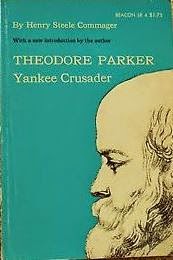The generation of Unitarian ministers and intellectuals who inhabited New England and the eastern United States during the antebellum 19th century did more to set the tone for the careful thought of American Unitarianism than any other generation or group of thinkers. Some of the more familiar names of the American Renaissance - names like Emerson and Thoreau (arguably) - or the less famous, but influential nonetheless - Channing, Howell, or Parker - found their intellectual home-ground not only in the liberal, reason-oriented faith of Unitarianism, but in each other. While Ralph Waldo Emerson was the spiritual - almost other-worldly - figurehead of this free-thinking movement, none brought so catholic a series of interests, such a broad base in learning, as Theodore Parker. If Emerson was the renowned and removed philosopher, Parker translated all his learning into a religion of the social, and brought the energy of his faith squarely to Earth.
Most famous for his work opposing slavery, Parker believed that faith and spirituality must be embodied. Perhaps it was little surprise that this man who spent so much of his formative days at labor, working until his hands were rough-hewn and callous, saw the practicable side of religion as his faith's true calling. Not only would Parker denounce slavery from the pulpit, he personally helped to move escaped slaves along the Underground Railroad, north to Canada. Standing against slavery, Parker would cajole, beseech, and even threaten men who disagreed with his theology of freedom - both privately and publicly. No peacenik was he: Parker's faith gave him the conviction that some evils must be opposed, first by reason and intellect, but if need be, by force.
It was remarked of Thomas Henry Huxley that he was "Darwin's Bulldog:" a tireless advocate for the theory of evolution while Darwin remained in retreat at Down House. We might similarly cast Parker as Emerson's, or Unitarianism's Bulldog - crusading for the right of reason and consciousness to govern men's social and spiritual lives. It might be fairly leveled at contemporary Unitarians that they are too intellectual and theoretic, too removed from the everyday articulations and actions of the spirit. Perhaps modern-day Unitarianism has inherited too much of Emerson's mind and not enough of Parker's energy.
